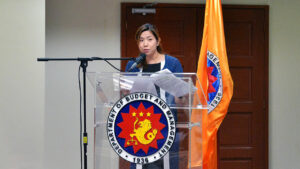THE Department of Budget and Management (DBM) said an initial assessment in the first quarter of the government’s revenue prospects will determine any adjustments to the 2026 budget estimate of over P6.79 trillion.
“The budget really increases because of increasing revenue collections. That’s why we have to review the targets in the first quarter to determine the level of the budget in 2026,” Budget Assistant Secretary Rolando U. Toledo told reporters on the sidelines of a briefing on Wednesday. He was responding to a query on the size of the 2026 budget and whether the projection contained in the Budget of Expenditures and Sources of Financing (BESF) remains valid.
According to the National Government’s fiscal program, the expenditure program for 2026 is P6.793 trillion.
“If you look at the medium-term fiscal framework (MTFF), there is an amount already, but we will still review this in the first quarter. It’s still up for review because I know Finance Secretary (Ralph G. Recto) is lining up new revenue measures,” Budget Secretary Amenah F. Pangandaman said at the same briefing.
Mr. Toledo said the Development Budget Coordination Committee (DBCC) will still review the 2026 expenditure program to consider macroeconomic factors such as economic growth, inflation, the exchange rate, and fuel prices.
Meanwhile, Ms. Pangandaman assured that the 2025 budget was constitutional and will not be used for electioneering.
“It is not an election budget. It is the budget of the people. We can use the budget to make sure that it contributes to the overall macroeconomic targets of the National Government,” she said when asked whether 2025 budget will play a role in election campaigning.
The government’s expenditure plan for 2025 was fixed at P6.326 trillion, up 10.1% from 2023.
She added the budget will help the Philippines achieve upper-middle income status this year, as well as reduce poverty and earn the country an “A” credit rating.
She added that the Ayuda sa Kapos ang Kita Program (AKAP), a social-assistance program for low income persons, will also help the government hit its economic growth and expenditure targets. AKAP faced calls to remove the program from the 2025 budget, amid allegations that the program could be used for electioneering.
“There is a provision in the draft that politicians are prohibited from putting tarpaulins, faces on stickers, and T-shirts if they give cash assistance or social protection programs… Social Welfare Secretary Rexlon T. Gatchalian (will) also ensure that it will not be used by those running in the coming election. I support his pronouncement,” Ms. Pangandaman said.
She added that the departments of Labor and Employment, Social Welfare and Development, and National Economic and Development Authority (NEDA) are drafting guidelines for the conditional implementation of the program to ensure proper targeting of beneficiaries.
Ms. Pangandaman also noted NEDA Secretary Arsenio M. Balisacan’s proposal to use the national ID to ensure no duplication in AKAP disbursements.
“One of the provisions that they added is to make sure that the client is indeed affected by the effects of inflation. At the same time, they will apply a ceiling on the number of household members that can avail of AKAP to minimize instances of duplication. I think that is around P5,000 for every family,” she said.
“According to the COMELEC (Commission on Elections) chair, AKAP can be implemented as long as there is no politicizing,” Mr. Toledo added. — Aaron Michael C. Sy
